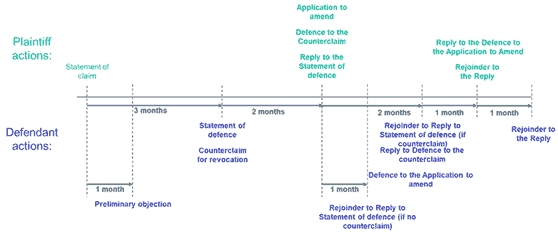
What patents can be used to bring infringement actions at the UPC?
An infringement action can be brought at the UPC using any Unitary Patent or any European Patent that has not been opted-out (or that, if opted-out, can be opted back in without having been subject to any national court proceedings).
What are the main stages in the procedure and the timescales?
As is the case for revocation proceedings, the UPC aims to reach a decision quickly, typically within 12 months of the action being brought. The procedure is mainly written and the deadlines for the parties’ written pleadings are short:

The procedure starts with the claimant’s statement of claim, which must include a very complete and detailed explanation of the claimant’s case. Within a month of service the defendant has the opportunity to challenge the jurisdiction of the UPC or the division by filing a preliminary objection, but it is important to note that a preliminary objection does not stop the clock for the filing of the statement of defence and any counterclaim. Within 3 months of the statement of claim being served, the statement of defence and, if relevant, counterclaim for revocation is due. There are then various exchanges of pleadings, some of which are compulsory but most of which are optional, up to a maximum time duration of approximately 9 months for the written procedure.
After the written procedure, the action enters an interim procedure managed by the judge-rapporteur and to be completed within 3 months of the end of the written procedure. The aim of the interim procedure is to prepare the case for the oral hearing. The judge-rapporteur seeks to identify the main issues and the facts which are in dispute by clarifying the positions of the parties where necessary. The judge-rapporteur may order a party to produce further pleadings, documents, evidence or experts. In addition, a schedule for the remainder of the proceedings will be established and the possibility of settlement explored. The interim procedure may include a case management conference between the judge-rapporteur and the parties, usually by video or telephone conference.
The oral procedure follows the interim procedure; the presiding judge will normally take over the management of the action at this stage. It is intended that the oral hearing (trial) should require a single day for most cases. To enable this, the presiding judge may in advance impose time limits on the parties’ oral submissions. Witnesses or experts may be heard at the oral hearing and may be questioned by the judges and the parties. The oral
hearing will normally be held in person but the Court may allow a party or person to attend by video conference or even, if the parties agree, to hold the oral proceedings by video conference. The oral hearing will normally be public. A decision is intended to be provided after the closure of the oral hearing, with written reasoning within 6 weeks. Costs are handled separately; the basic principle is that the loser pays.
Which UPC Divisions are responsible for infringement actions?
An infringement action may be brought before any of the Local or Regional Divisions where an infringement occurs or a defendant is based. If a counterclaim for revocation is filed, this may also be heard in the local or regional division in which the infringement claim was brought, or referred to the central division by the local or regional division of its own motion (in which case with the infringement claim will be either suspended or continued with by the local or regional division), or both the infringement claim and counterclaim for revocation can be referred to the central division if both parties agree.
Who are the Judges?
Infringement proceedings in the Local and Regional Divisions will usually be heard by three legally qualified judges; a further technically qualified judge may also be appointed at the request of parties or on the initiative of the court. Alternatively, the parties may agree to have the case heard by a single legally qualified judge. The judges are nationals of Contracting States.
What is the language of proceedings?
One of the official languages of the Contracting State hosting the court, one of the official languages of the EPO, or the language in which the patent was granted by the EPO. Most of the Local and Regional Divisions (with the exception of Milan) have adopted English as an official language of proceedings; for the Milan Division the language of the granted patent (which may be English) may be selected at the agreement of the parties and Local Division.
Are there any Court Fees?
The Court Fee for an infringement action is formed from two components; a fixed fee of €11,000 and a value-based fee determined by the value of the case. The value-based fee component increases with the value of the case, varying between €0 (for cases valued at up to and including €500,000) and €325,000 (for cases valued at more than €50,000,000).
Please contact your usual HLK attorney or upc@hlk-ip.com if you would like further details of our UPC litigation offering, or view our UPC webpage for more UPC information and updates.
This is for general information only and does not constitute legal advice. Should you require advice on this or any other topic then please contact hlk@hlk-ip.com or your usual HLK advisor.
